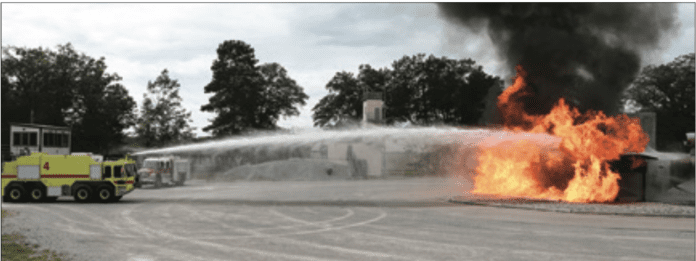I was a student pilot with approximately 20 hours. During one of my flights back to my home airport, I was talking to the tower and was given approach instructions. Then the frequency lit up with an emergency call, the pilot reporting engine failure. The airplane had lost its engine on takeoff and the pilot was trying to return to the airport.
All the tower’s traffic was put into a hold and I was instructed to make 360-degree turns over the Interstate highway, which was approximately five miles from the airport. I heard the pilot and passenger screaming over the radio in complete panic, and then I saw a large fireball and smoke near the airport.
Within a few minutes, I was cleared into the airport’s airspace and landed. As I taxied to the FBO, my flight instructor was outside waiting on me. He said, “Let’s go,” and asked me about what I saw and heard. He took me to the accident scene—the fire was just about out. It was horrific. The plane hit a house at a 90-degree angle—there were no survivors.
I am not sure how my instructor was able to get clearance to go on scene, but I will never forget it! We walked around for a moment, and then returned to the FBO. The instructor asked me what I thought happened and what could have been done. My answer was simple: They panicked. As evidence, I told him I heard them on the radio when they tried to return to the airport.
He then asked, “What should have happened?” Again, my 22-year-old self answered quickly: “They should have leveled the wings and ditched in the bay.” They crashed approximately 75 feet from the Intercoastal Waterway. The water depth in that area is approximately 1-4 feet.
He paused for a moment and asked, “What’s the difference between them and you?” I didn’t answer. He then said, “One poor decision, and don’t think it can’t happen to you.”
To this day, I think of that event often and the unforgiving nature of flying. I am so lucky to have had a flight instructor that stressed the basics—safety and having options. He always said, “Never quit flying the airplane; everything else will work out.”
Words to live by.
Have you encountered a situation or hazardous condition that yielded lessons on how to better manage the risks involved in flying? Do you have an experience to share with Aviation Safety’s readers about an occasion that taught you something significant about ways to conduct safer flight operations? If so, we want to hear about it.
We encourage you to submit a brief (500 words) write-up of your Learning Experience to Aviation Safety for possible publication. Each month, Aviation Safety publishes a collection of similar experiences sent to us by readers. Sharing with others the benefit of your experience and the lessons you learned can be an invaluable aid to other pilots.
You can send your account directly to the editor by e-mailing it to [email protected]. Put “Learning Experience Submission” in the subject line; add your name and daytime telephone number at the bottom of the e-mail.
Your report will be considered for publication in the Aviation Safety’s readers’ forum, “Learning Experiences,” and may be edited for style and length. Anonymity is guaranteed if you want it. No one but Aviation Safety’s editor is permitted access to the reports. Your name and telephone number are requested only so that the editor can contact you, if necessary.
While we can’t guarantee your submission will get published, we can guarantee that we’ll closely review and consider using it.
All Learning Experiences submissions become the property of Aviation Safety and may be republished.




